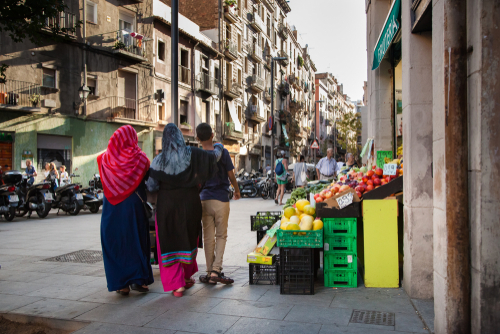
Two decades ago, Catalonia’s global image was dominated by the independence movement — massive Diada marches, the 2017 referendum, and the rhetoric of sovereignty. Today, it is the province’s transformation itself that captures attention: an unprecedented influx of migrants, a growing Muslim population, and rising concern over urban crime have converged to redefine the region’s political and cultural landscape.
A demographic revolution
Barcelona and its metropolitan area have become a mirror of twenty-first-century Europe. According to the Catalan Statistical Institute (Idescat), one in five residents in Catalonia was born abroad, rising to 31 per cent in the city of Barcelona. Municipal data reveal that native-born Catalans now represent only 45 per cent of Barcelona’s residents, and less than half of those under 40. The most represented origins are Morocco, Pakistan, Colombia, Honduras, and Italy, reflecting both long-standing Latin American ties and new migration routes from North Africa and South Asia.
Over 600,000 Muslims now reside in Catalonia — roughly 8 per cent of its population — making it the region with the highest concentration of Islamic places of worship in Spain. The expansion of mosques, cultural associations, and Arabic or Amazigh language programmes has turned towns such as Vic, Salt, and Reus into case studies of multicultural integration — and tension.
From identity anxiety to political calculation
Catalan nationalism’s relationship with immigration has always been ambivalent. In the early 2000s, leaders such as Jordi Pujol or Marta Ferrusola openly warned that uncontrolled migration could “dilute Catalonia’s identity”. Yet, within a few years, the same political tradition began to view migration as a potential instrument of linguistic and electoral engineering. Programmes such as the Fundació Nous Catalans and the Plan Marruecos 2014–2017 were designed to engage Moroccan and other North-African communities through Catalan-language promotion and civic participation, with the underlying aim of fostering a society less Spanish-speaking and more aligned with the pro-independence project.
In practice, this strategy has produced effects very different from those intended. The demographic growth of non-Spanish-speaking populations — particularly from North Africa and sub-Saharan Africa — has altered the cultural composition of many Catalan towns, challenging both the nationalist narrative of linguistic cohesion and the broader model of integration. Critics within Catalonia and across Spain now describe the policy as a form of self-inflicted wound: by prioritising newcomers who did not share the Spanish language, the independence movement has weakened its own social base without achieving greater cultural homogeneity.
A parallel debate is unfolding in the Basque Country, where the leader of the Basque Nationalist Party (PNV) recently remarked that “the next president of the party may be called Hassan” — a comment intended to signal inclusivity but interpreted by some as evidence of how deeply demographic change is reshaping traditional nationalist movements across Spain.
For many long-time residents, the rapid transformation of neighbourhoods and the visible presence of new religious symbols have triggered what sociologists call “cultural insecurity”: a sense of displacement both emotional and empirical, and powerful enough to reshape politics across the region.
Crime and the perception of insecurity
Barcelona today ranks among Spain’s most crime-affected urban areas. The 2025 municipal barometer shows that 26.5 per cent of residents cite insecurity as their top concern, compared with just 8 per cent ten years ago. Police data reveal that theft remains the most common offence, followed by assaults and sexual crimes, even as overall criminal activity fell by 6.6 per cent this year.
The phenomenon of repeat offenders continues to test law enforcement: 280 multirecidivist criminals accounted for more than 1,700 arrests and over 5,000 recorded offences in the first half of 2025. At the same time, Interior Ministry statistics indicate that foreign nationals are significantly overrepresented in arrest data, a reflection of both cultural traits and socioeconomic marginalisation, legal status, and concentrated poverty.
The political backlash: Aliança Catalana’s rise
Out of this mix of identity anxiety, social fragmentation, and perceived insecurity, a new political force has emerged. Aliança Catalana, a nationalist party founded in 2022, has rapidly gained ground by linking cultural protection with security rhetoric. It entered the Catalan Parliament in 2024 and now targets the 2027 municipal elections with ambitions to secure seats in the Barcelona City Council.
The party’s discourse portrays the region’s demographic changes as evidence of “cultural replacement” and demands tougher policing, stricter immigration control, and the defence of Catalan identity. Its success reflects a wider European pattern: the transformation of local grievances about urban disorder into ideological movements that merge populism with regional nationalism, all boxed into a common-sense policy rhetoric that certainly appeal to an increasing number of Catalans according to the polls, especially visible in working-class districts, where access to housing, education, and healthcare is strained — a breeding ground for both crime and resentment.
Between openness and order
The debate over Islamisation, immigration, and crime in Catalonia is ultimately a reflection of Europe’s wider struggle: how to balance openness with order, pluralism with cohesion. While the statistics show that insecurity is as much about perception as about fact, the political consequences are real.
Catalonia has become Spain’s laboratory — a testing ground for how far a society built on identity and language can stretch before it fractures. So far, it is failing the experiment, offering a stark warning to the rest of the country, where demographic trends suggest a similar trajectory.
Whether Spain can learn from this experience will depend less on ideology than on realism. The challenge is to preserve social cohesion without denying demographic reality — to manage diversity without losing a shared civic framework. In many ways, Catalonia is no longer an exception but a preview of what much of Europe may soon face —and already does in many places: the collision between openness, security, and identity in an age of profound change.



 Subscribe
Subscribe